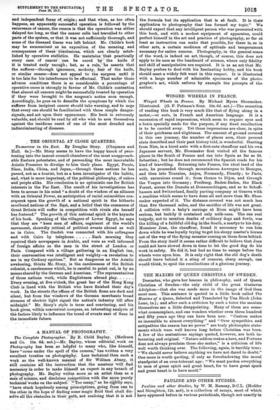WINGED WHEELS IN FRANCE.
Winged Wheels in Prance. By Michael Myers Shoemaker. Illustrated. (G. P. Putnam's Sons. 108.6d. net.)—The sensation of reading this book is very much like that of flying along in a motor,—or auto, in French and American language. It is a succession of rapid impressions, which seem to require eyes and a brain specially made for the purpose, if any fixed recollection is to be carried away. Yet these impressions are clear, in spite of their quickness and slightness. The amount of ground covered in this one journey, the number of places seen, their present state described and their past history told, is wonderful. Starting from Nice, in a hired auto with a first-rate chauffeur and his own Japanese servant, Mr. Shoemaker first visited all the famous places in the South of France and ran into Spain as far as St. Sebastian ; but he does not recommend the Spanish roads for his kind of travelling. Returning into France, the ideal land of the auto, he proceeded through mountainous Auvergne to Bourges, and then into Touraine, Anjou, Normandy, Picardy; to Paris, with excursions round it; from thence to Dijon, and through the Vosges into Germany ; Freiburg, Baden-Baden, the Black Forest, across the Danube at Donaueschingen, and so to Schaff- hausen and Switzerland, finally parting company at Geneva with a machine which seems to have done all and more than Mr. Shoe- maker expected of it. The distance covered was not much less than five thousand miles, and the sacrifice of life was not great. A collision with a baby's carriage at Riom might have been serious, but luckily it contained only milk-cans. The one real traledy; not to niention deaths of ordifiarf dogs and fowls, was the killing of a faithful old dog in the South, a martyr to his duty. Monsieur Jean, the chauffeur, found it necessary to run him down while he 'was loyally trying to get his sleepy master's horses out-of the way of the flying monster coming on them from behind. From the story itself it seems rather difficult to believe that Jean could not have slowed down in time to let the good dog do his work in safety. He did it, but had no time to escape before the wheels were upon him. It is only right that the old dog's death should leave behind it a sting of remorse, sharp enough, one would think, to spoil the recollections of a glorious journey.
















































 Previous page
Previous page